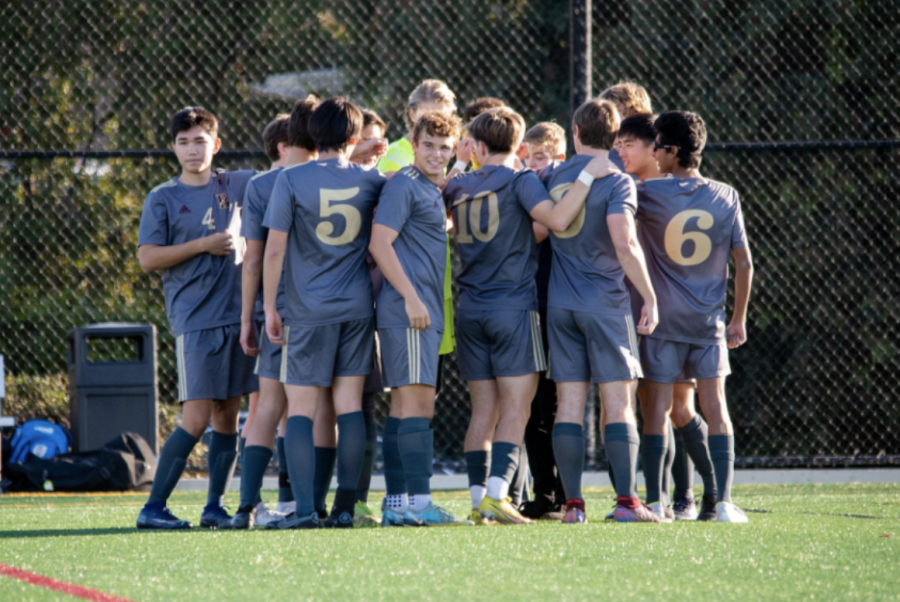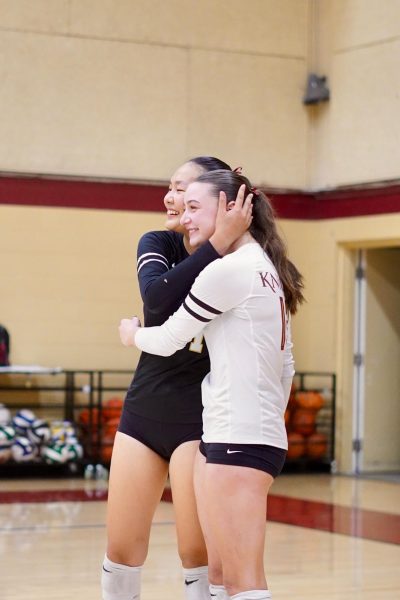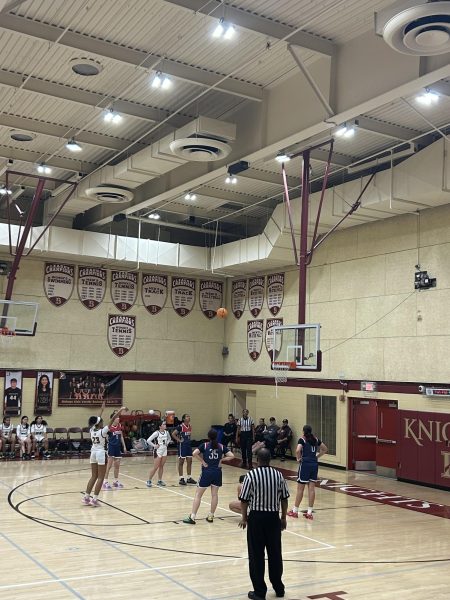Which Team Are You On?
Team sports and individual sports have many differences — what can each side learn from the other?
Teams, like the Boys Varsity Soccer Team, have the addition of comradery and support, which make group effort essential to success in competition.
The only child gets all the attention; however, having siblings provides playmates and advocates for life. A solo singer controls every note to ensure perfection; however, a choir can produce a beautiful harmony of voices. Similarly, an individual athlete can entirely command the outcome of a match; however, teammates can pick eachother up when they fall down.
As an individual athlete, “you have to believe in yourself when no one else does,” as 23-time Major champion, tennis icon Serena Williams once said. But it is just as hard to be a team athlete: not giving in to pressure when everyone else depends on you. This leads to a long-debated question in the sports world: which is harder — the lack of support or the pressure of total support?
Lucy Yuan (‘24), the 28th ranked junior golfer in the American Junior Golf Association rankings and a member of the Girls’ Varsity Golf Team, said that playing on the school team compared to her personal competition added “much more pressure, and also excitement” because “every shot and every decision you make has either a benefit or a consequence for not just yourself but the entire team.”
Individual athletes also face mental challenges. Director of Student-Athlete and Coaching Development Coach Shane Walton (‘98) explained that as an individual athlete, “you have to be so emotionally and mentally strong to push yourself when you want to give up because there is no one else to motivate you.” Alex Pfister (‘25) — a varsity player for field hockey, waterpolo, and lacrosse — indicated that “everything is a team effort, you are never solely responsible, which takes some negativity off you.” Meanwhile, Ryan Davis (‘23), a player on Varsity Boys Golf, explained that when playing a team sport “motivation comes from others” but in individual sports “you have to motivate yourself. No one really cares if you don’t come to practice, you have to determine your training schedule and motivate yourself to get better.”
Coach Walton said, “There is not anyone else to motivate you when you play an individual sport” but that “a team can support you when you are down, and bring comradery to winning and losing.” Jack Harvey (‘25), a Varsity Football player and Junior Varsity Tennis player, added that “a team can take the pain off losing without diluting the winning feeling.”
On the contrary, individual sports put tremendous pressure on one person to succeed, which sometimes makes the pain of losing feel much worse. Coach Walton explained that for individual athletes, “there is nowhere to hide” and they are “on their own.” This pressure was highlighted in a study by the National Library of Medicine (NIH), in which 14 percent of individual athletes reported anxiety or depression, while only seven percent of team athletes reported this.
Unfortunately, due to the lack of a team — which can give support, structure, and a place to put some blame from losses — individual athletes frequently have to sacrifice mental health to compete. Jack explained, “It’s just you and the court. If you lose, that is on no one but you, and that can make you feel terrible.”
Along with the mental side, the physical training itself varies between team and individual sports. According to an NIH Study, 93.9 percent of 867 adolescents said individual sports were high intensity, while only 81.4 percent of the same 867 adolescents said team sports were high intensity.
Bishop’s students commented on their physical training and intensity as well. Weekly practice times varied from student to student, and sport to sport, but the overall takeaway is how committed all athletes are. Every interviewed athlete reported over 10 hours of weekly practice, which, with school and social time, is a significant number.
Some athletes go even further —like Lucy — who explained that “during the school year [she] plays about 20 to 25 hours” per week. Similarly, Alex explained that for her and most of her teammates, the combination of high school and club teams can add up to over 15 hours per week during the season.
In fact, Coach Walton explained that neither individual nor team sports “are inheritably more difficult, they just have different challenges.” He added, and said that a challenge in individual sports is being emotionally and mentally strong, while the challenge of team sports is that “your mistakes can affect others, and while they may pick you up, it puts a different pressure to perform.”
Ryan added, “When you are playing as an individual you are more free, you don’t have to consider anyone else but yourself,” but as a team athlete “there is more pressure to not just do good for yourself, but your teammates as well.”
While both have their differences, challenges, and benefits, team athletes and individual athletes can both learn from the other side and improve their own training, mindsets, and outlook.
For team athletes, Lucy suggested that if they “are not doing their best because they can rely on their team, [she] would advise them to treat it more like an individual sport, which translates to self motivation.” Ryan added that “Motivation coming from yourself is going to be stronger than coming from anyone else because it is more true and consistent.” Lastly, Lucy concluded that “at the end of the day you can’t rely on others, because it is not fair to you and everyone else.”
And for individual athletes, Coach Walton suggested that they carefully “toe the line between being cocky and confident,” because while “being on a team sport humbles you” individual athletes do not experience that.
So while sports can change so much depending on the addition, or lack of, a team, both types of athletes face similar, and different, mental, physical, and emotional challenges. But perhaps the most important thing to remember, is that be it basketball or tennis, football or golf, sports are meant to be fun. Be it with a team or not, as long as sports conceive joy and community, they will continue to be worth the challenges.

Ben is a senior and Editor-in-Chief of The Tower. This is his fourth year on staff and second year as an editor, having previously been Graphics Editor....







